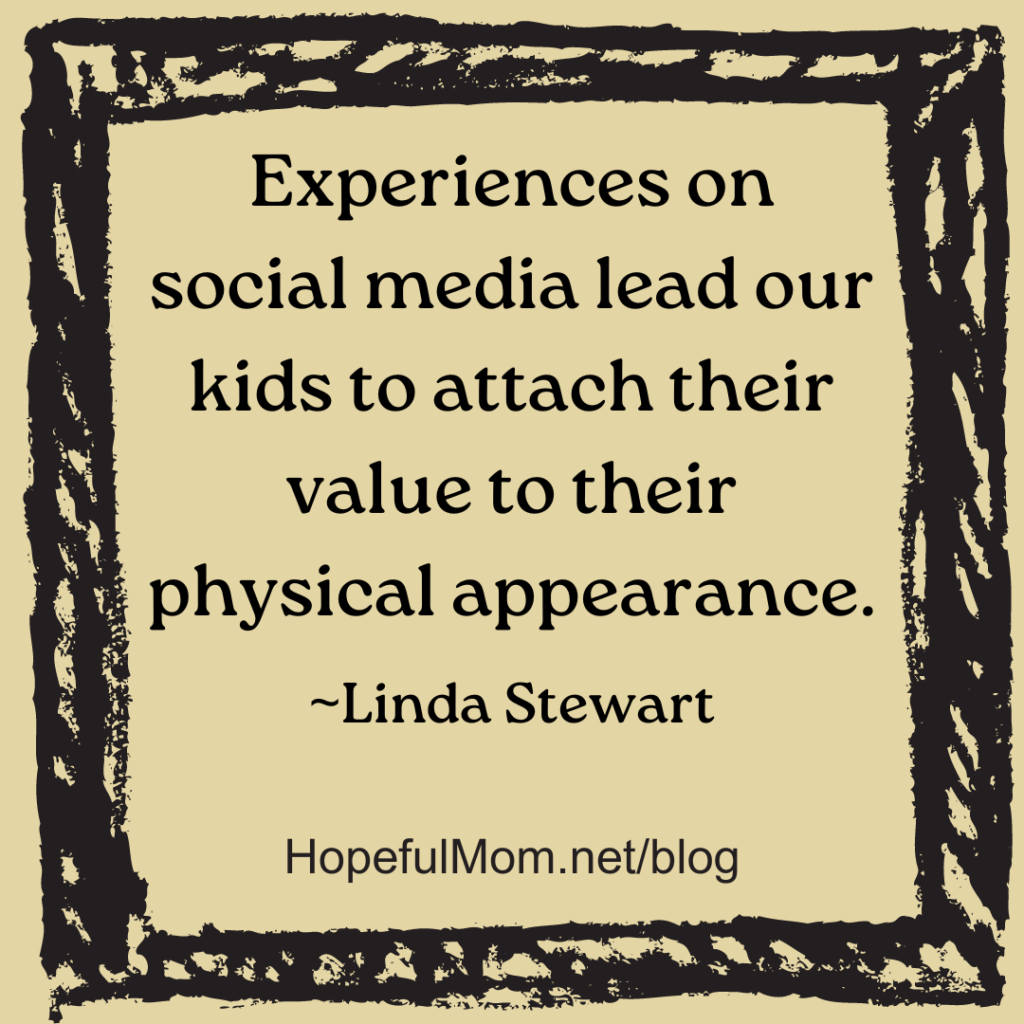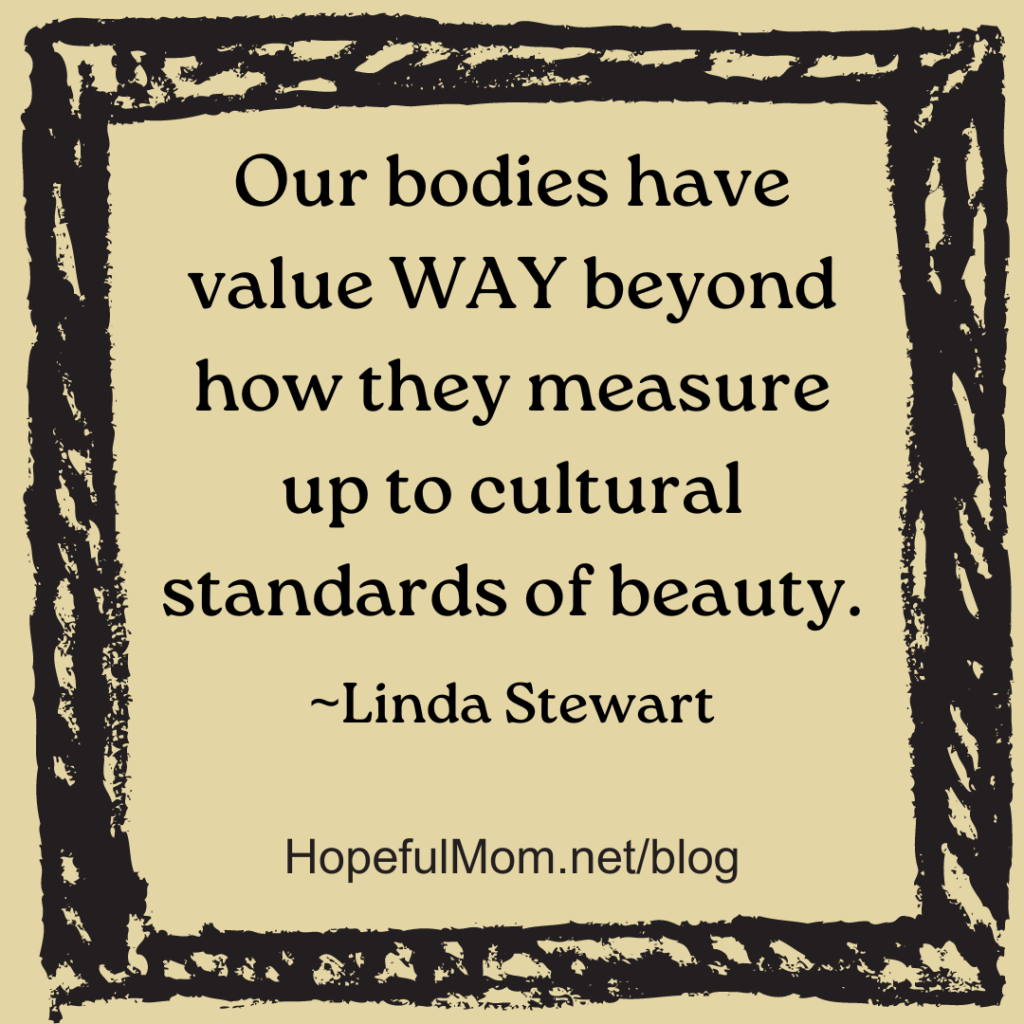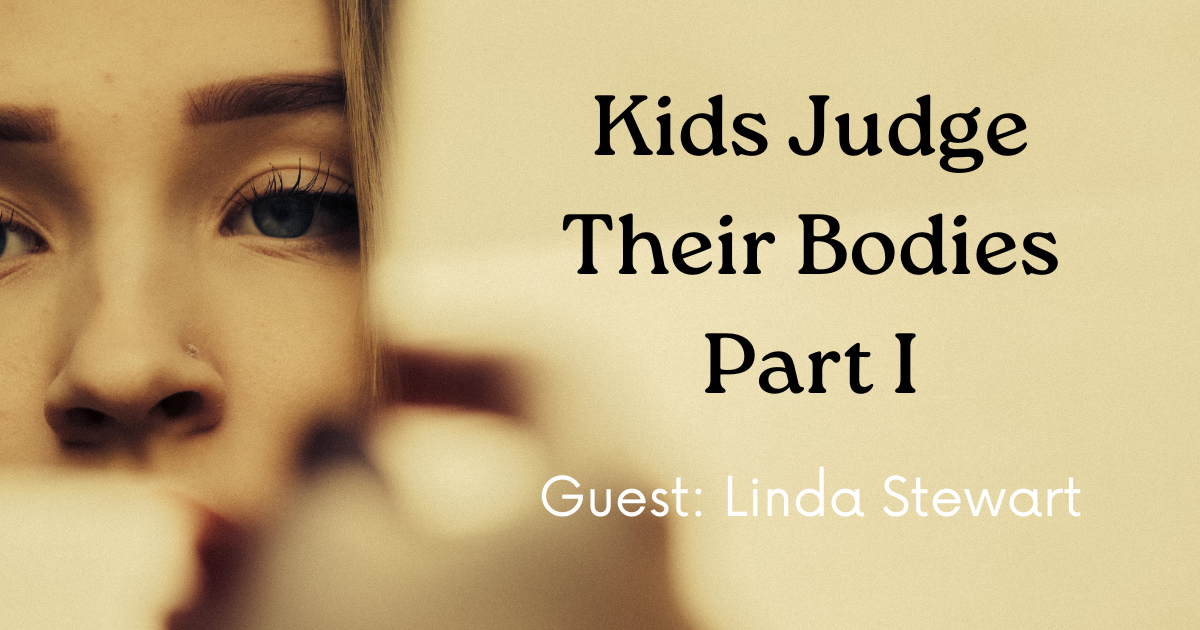My friend Linda Stewart is our guest for this post. She talks with us about how kids (and, let’s face it, us too) judge themselves based on their bodies. I learned some things in this post, and I hope you do, too! Linda co-wrote Before the Sex Talk: A Theology of the Body Approach for Parents and Mentors and is a board member of Sexual Integrity Leaders. (I’m speaking at their summit in May 2024. I highly recommend attending!)
We’ve learned to judge ourselves and our bodies. Messages that our value is based on our physical appearance seem to circulate in the air around us! We’ve also learned to judge others the same way, and we tend to pass what we’ve learned down to our kids, even if we don’t mean to. How can we stop passing these messages onto our children and replace the damaging thoughts that shape our and our kids’ self-assessments?
At THE Conversation website, Linda Noble and I established that we are embodied human persons, that the body expresses the person, and that the body and the person can’t be separated. It’s so important to integrate the value of the person with the person’s body. In what way is the value of my person related to the way I see my body?
Well, the perceived answer quickly becomes a personal one, so I’ll just speak from my own experience. I might be able to give a good Sunday school answer, “If I had a God-made price tag attached to my person it would read, ‘PRICELESS.’” Admittedly, it’s easier for me to say this about others. With an internal struggle, that would be invisible to you, I could admit that I am priceless because God sees me as priceless. But if I had to concede that this God-made price tag would necessarily be attached to my body that expresses my person, I would more likely cringe. I evaluate my body with a different kind of criteria and sometimes this means more to me than the value God claims that He has bestowed on me as a person. Throw aging and health related issues into the mix, and the criteria with which I tend to evaluate my body’s appearance drastically reduces the number of days that I can honestly assign a positive value to my own body and therefore my embodied self.
Culture encourages us to sculpt and enhance the appearance of our bodies in an attempt to feel better about ourselves to get others to notice us. Kids Judge Their Bodies – Part I #hopefulmom #mentalhealth Click To TweetCulture tends to encourage us to sculpt and enhance the appearance of our bodies in an attempt to feel better about ourselves as well as to get others to notice and affirm us. Do you hear how that language reveals that we use our bodies in attempts to increase our perceived value? Social media and technology present us and our children with so many possible ways to put our physical bodies in front of an audience and seek affirmation that my body is good enough, or even to get agreement from others about the parts of my body that aren’t good enough. These options are on a continuum of less harmful to truly harmful. Many kids today are encouraging each other and celebrating each other with fire and heart emojis and comments about each other’s appearance. Some though, are bullied or shamed by friends or total strangers. Both experiences attach our kids’ value to their physical appearance, and the toll this takes can be subtle and nuanced. This teaches our children that their value is dependent on the judgment their body receives.

It can feel so good to be noticed, and when people notice us approvingly, even though it’s not possible for our inestimable value to go up, we often feel like it does. The reverse holds true as well, when I or someone else judge my appearance as not great, it feels to me like my value then plummets. But the good news is that our bodies have value WAY beyond how they measure up to cultural standards of beauty. Our bodies are God’s design for expressing our person made in the image of God.

Each person – each embodied person – images God in an “irreplaceable and unrepeatable way.” Since I am a body-person, and my body and person are inseparable, my body must be judged as priceless (both by myself and by others). It expresses the beauty of my person as a reflection of God.
THIS truth is a gift that we can give our kids and the kids we work with. Together, we can help our kids reframe or even prevent them from internalizing the message that the body’s appearance is a source of their value and worth.
What are some practical ways to do this? We’ll explore this answer in Part Two.
Check out Barb’s upcoming speaking engagements. (You’ll find info regarding the Sexual Integrity Leadership on this page.) Subscribe at Barb’s YouTube channel! While you’re there, check out the Barb in Public playlist. You’ll find links to interviews, podcasts, and public speaking engagements.
About the author

Linda M. Stewart, MA, LMFT
Linda Stewart is co-founder of THE Conversation Workshop, and owner of Collaborative Therapy Center where she works with women and couples. She integrates Theology of the Body into her therapeutic work, and speaks to therapists, church leaders, parents and premarital couples about “this beautiful vision for the body, relationships and sex.” Linda co-authored the book, Before the Sex Talk: A Theology of the Body Approach for Parents and Mentors. She serves on the Board of the Sexual Integrity Leaders. Linda lives and has fun with her family in Southern California.


